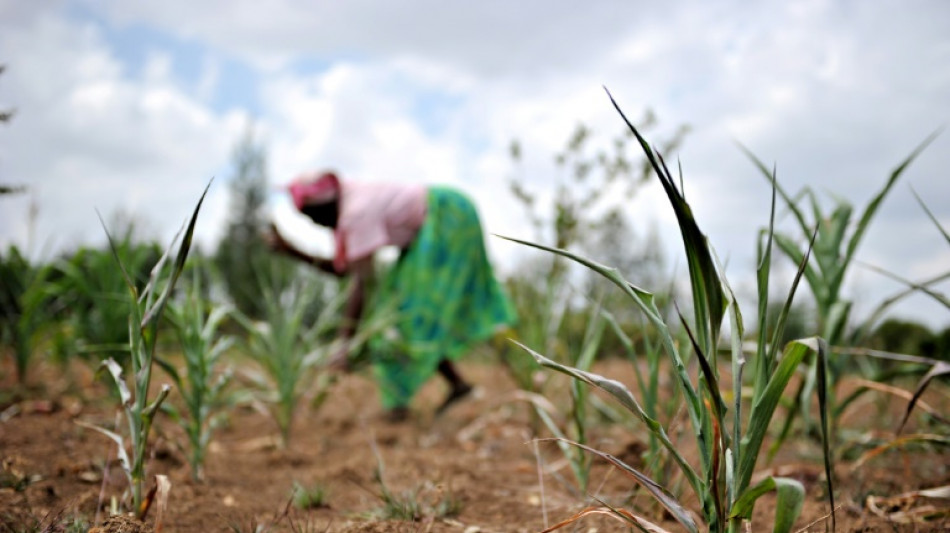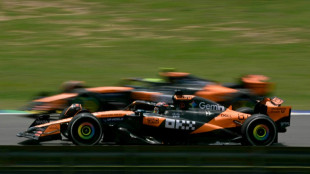
-
 Deadly storm sparks floods in Spain, disrupts Portugal vote
Deadly storm sparks floods in Spain, disrupts Portugal vote
-
Ukrainian flag bearer proud to show his country is still standing

-
 Carney scraps Canada EV sales mandate
Carney scraps Canada EV sales mandate
-
Morocco says evacuated 140,000 people due to severe weather

-
 Spurs boss Frank says Romero outburst 'dealt with internally'
Spurs boss Frank says Romero outburst 'dealt with internally'
-
Giannis suitors make deals as NBA trade deadline nears

-
 Carrick stresses significance of Munich air disaster to Man Utd history
Carrick stresses significance of Munich air disaster to Man Utd history
-
Record January window for transfers despite drop in spending

-
 'Burned inside their houses': Nigerians recount horror of massacre
'Burned inside their houses': Nigerians recount horror of massacre
-
Iran, US prepare for Oman talks after deadly protest crackdown

-
 Winter Olympics opening ceremony nears as virus disrupts ice hockey
Winter Olympics opening ceremony nears as virus disrupts ice hockey
-
Mining giant Rio Tinto abandons Glencore merger bid

-
 Davos forum opens probe into CEO Brende's Epstein links
Davos forum opens probe into CEO Brende's Epstein links
-
ECB warns of stronger euro impact, holds rates

-
 Famine spreading in Sudan's Darfur, warn UN-backed experts
Famine spreading in Sudan's Darfur, warn UN-backed experts
-
Lights back on in eastern Cuba after widespread blackout

-
 Russia, US agree to resume military contacts at Ukraine talks
Russia, US agree to resume military contacts at Ukraine talks
-
Greece aims to cut queues at ancient sites with new portal

-
 No time frame to get Palmer in 'perfect' shape - Rosenior
No time frame to get Palmer in 'perfect' shape - Rosenior
-
Stocks fall as tech valuation fears stoke volatility

-
 US Olympic body backs LA28 leadership amid Wasserman scandal
US Olympic body backs LA28 leadership amid Wasserman scandal
-
Gnabry extends Bayern Munich deal until 2028

-
 England captain Stokes suffers facial injury after being hit by ball
England captain Stokes suffers facial injury after being hit by ball
-
Italy captain Lamaro amongst trio set for 50th caps against Scotland

-
 Piastri plays down McLaren rivalry with champion Norris
Piastri plays down McLaren rivalry with champion Norris
-
ECB holds interest rates as strong euro causes jitters

-
 Spain, Portugal face floods and chaos after deadly new storm
Spain, Portugal face floods and chaos after deadly new storm
-
EU close to sealing trade deal with Australia

-
 German Cup final to stay in Berlin until 2030
German Cup final to stay in Berlin until 2030
-
What does Iran want from talks with the US?

-
 Taming the lion: Olympians take on Bormio's terrifying Stelvio piste
Taming the lion: Olympians take on Bormio's terrifying Stelvio piste
-
Wind turbine maker Vestas sees record revenue in 2025

-
 Italy's Casse tops second Olympic downhill training
Italy's Casse tops second Olympic downhill training
-
Anti-doping boss 'uncomfortable' with Valieva's coach at Olympics

-
 Bitcoin under $70,000 for first time since Trump's election
Bitcoin under $70,000 for first time since Trump's election
-
'I am sorry,' embattled UK PM tells Epstein victims

-
 England's Brook predicts record 300-plus scores at T20 World Cup
England's Brook predicts record 300-plus scores at T20 World Cup
-
Ukraine, Russia swap prisoners, US says 'work remains' to end war

-
 Wales' Rees-Zammit at full-back for Six Nations return against England
Wales' Rees-Zammit at full-back for Six Nations return against England
-
Sad horses and Draco Malfoy: China's unexpected Lunar New Year trends

-
 Hong Kong students dissolve pro-democracy group under 'severe' pressure
Hong Kong students dissolve pro-democracy group under 'severe' pressure
-
Germany claws back 59 mn euros from Amazon over price controls

-
 Germany claws back 70 mn euros from Amazon over price controls
Germany claws back 70 mn euros from Amazon over price controls
-
VW and Stellantis urge help to keep carmaking in Europe

-
 Stock markets drop amid tech concerns before rate calls
Stock markets drop amid tech concerns before rate calls
-
BBVA posts record profit after failed Sabadell takeover

-
 UN human rights agency in 'survival mode': chief
UN human rights agency in 'survival mode': chief
-
Greenpeace slams fossil fuel sponsors for Winter Olympics

-
 Greenpeace slams fossel fuel sponsors for Winter Olympics
Greenpeace slams fossel fuel sponsors for Winter Olympics
-
Kinghorn, Van der Merwe dropped by Scotland for Six Nations opener

| CMSC | -0.17% | 23.48 | $ | |
| SCS | 0.12% | 16.14 | $ | |
| NGG | -0.71% | 87.17 | $ | |
| RBGPF | 0.12% | 82.5 | $ | |
| RYCEF | -0.36% | 16.62 | $ | |
| RIO | -4.49% | 92.335 | $ | |
| CMSD | 0.21% | 23.92 | $ | |
| GSK | 3.44% | 59.27 | $ | |
| BTI | 0.61% | 62.01 | $ | |
| BCE | -4.2% | 25.279 | $ | |
| RELX | 0.73% | 30 | $ | |
| BCC | -2.52% | 88.01 | $ | |
| VOD | -6.98% | 14.685 | $ | |
| AZN | 0.78% | 188.92 | $ | |
| BP | -2.42% | 38.275 | $ | |
| JRI | 0.3% | 13.19 | $ |

Disinformation soils Kenya's GMO debate
A Kenyan government decision to allow imports of genetically modified maize to help combat its food crisis has sparked disinformation, with leading politicians spreading unsubstantiated claims about the health risks of the crops.
In October last year, the East African nation lifted a decade-long ban on the cultivation and importation of GM crops, partly in response to the worst drought to ravage the Horn of Africa region in 40 years which has left millions hungry.
A Nairobi high court later blocked the decision, pending a ruling on a lawsuit brought by a farmers' lobby group which argues that the government move was unlawful.
But the lifting of the ban has triggered a wave of disinformation off- and online.
This included veteran opposition leader Raila Odinga falsely claiming that GM crops caused mutations in humans and President William Ruto making misleading assertions about their use in other countries.
"Both sides of the debate, those who are pro (genetically modified organisms) and those who are against GMOs, have been to some extent propagating that kind of misinformation," Anne Maina, national coordinator at the Biodiversity and Biosafety Association of Kenya, told AFP.
A 2023 study by the Alliance for Science, a project funded by the Bill & Melinda Gates Foundation, warned that Kenyans were "subjected to the world's worst misinformation" on GM crops.
According to the research, false or misleading claims "primarily originated in the form of quotes from prominent Kenyan politicians", which were then repeated in media reports.
- 'Not supported by evidence' -
Odinga has alleged that eating food made from GM crops would cause men to grow breasts and women to develop testicles. A video of his remarks at a public address on May 7 went viral on Facebook, with one post garnering more than 17,000 views.
Experts say there is no scientific proof of GM crops causing sex changes in humans.
"Claims of gender mutation are not supported by scientific evidence," the European Food Safety Authority (EFSA) said in an email to AFP.
The World Health Organization (WHO) says GM foods available on the market have passed safety assessments and are unlikely to be harmful.
About a decade ago, Odinga backed GMOs while serving as prime minister. However, he now says his stance was based on "limited information" and has since come to believe GM crops cause human mutations.
This puts him at odds with Kenyan President William Ruto, a GMO supporter who also faces opposition from other politicians.
- Politicised issue -
Ekuru Aukot, who ran in Kenya's 2017 presidential election race, told his 350,000 Twitter followers last year that lifting the ban was akin to "feeding people poison in the pretext of saving their lives".
Meanwhile, 2022 presidential candidate George Wajackoyah asserted that Mexico banned GM crops after cases of men developing breasts and women growing beards.
There is no evidence to back up this claim. In 2020, Mexico ordered the elimination of GM corn by next year, with its leader saying his country would "not accept transgenic corn for human consumption".
But the government rowed back in February following pressure from the US –- its main trading partner and the leading producer of GM crops -– announcing it would allow GM corn for animal feed and industrial food production.
In Kenya, Ruto also contributed to the spread of disinformation when he misleadingly said in a TV interview in January that South Africa and the United States were "100 percent GMO".
South Africa has so far approved the cultivation of only three GM crops while US supermarkets sell organic produce alongside GM products clearly labelled as such.
- Herbicide safety concern -
Many countries allow the import but not the cultivation of GM crops.
In Kenya, the GMO debate is "based on people and not fact", according to Joel Ochieng, the lead agricultural biotechnology researcher at the University of Nairobi.
"We have politicians in Kenya whose main business is to fight each other. Because the current president has said it is safe, the game (of the opposition) is normally to oppose," he told AFP.
Ochieng added that the main safety concern was not linked to the development of GM crops but glyphosate, a herbicide commonly used in tandem with them and which poses potential risks.
The WHO has classified glyphosate as "probably carcinogenic in humans" and several countries around the world have already banned the weedkiller.
However other agencies including the European Chemicals Agency (ECHA) have said that scientific evidence does not justify classifying glyphosate as a carcinogen.
Agriculture is the biggest single contributor to Kenya's economy, generating more than 21 percent of gross domestic product (GDP) last year, according to government figures.
Festus Kavita, a farmer in Machakos, about 65 kilometres (40 miles) southeast of Kenya's capital Nairobi, said he was worried that the political mud-slinging was standing in the way of addressing the country's real problems.
For him, using GMOs for animal feed would allow farmers to grow more organic crops for human consumption.
"It's a lose-lose debate in my opinion because it misses out on actual solutions," he told AFP.
G.AbuGhazaleh--SF-PST


